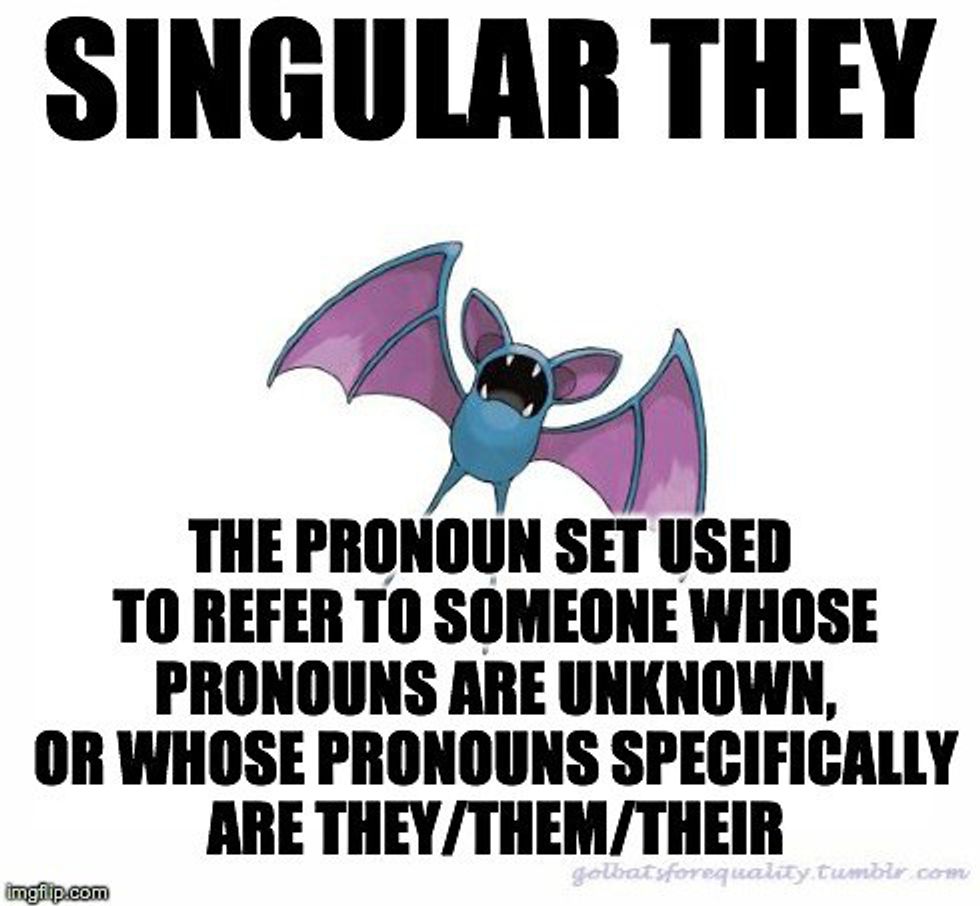With more people becoming aware of transgender and non-binary people, there have been a lot of questions circulating online and elsewhere about how to be more inclusive. Language is very important in making a space safer for trans and non-binary individuals. With language, there is an established and built-in measure of whether a place could be safe or unsafe. If the wrong language is used, the place is unsafe and shows a lack of education on trans and non-binary issues. With the right language and education, there can be more safe spaces for trans and non-binary people to exist without feeling the need to hide their identities or feel threatened for merely existing.
1. Use singular they for people whose pronouns you don't know, people who use those pronouns, and stop using him/her.
One of the most common, and often cluttered, phrases I hear when people try to talk about a person whose gender is unknown is he/she, him/her, (s)he. This is not only clunky and annoying to say, but ignores the fact that not everyone uses those pronouns or identifies as a man or a woman. When you say he/she you're really forgetting part of the population and making a lot of assumptions about people you don't know. This also goes for assuming a stranger's gender -- how someone presents isn't an indication of the gender they are or the pronouns they use. By assuming, you're misgendering someone before you even know them, when it is totally easy to use them, where you are assuming nothing. Singular they has been in use for hundreds of years. Using it will declutter language and create an environment in the world that allows for transgender and non-binary people to not be misgendered.
Source: genderqueerid.com
2. Stop using the words "opposite sex" or "both sexes" or "opposite gender" or "both genders".
Not only is this language erasing of transgender people outside the binary, but it is also erasing intersex people. The idea of the opposite of gender or sex, first of all, makes no sense. There is no opposite when it comes to biology, and since there are more than two sexes and more than two genders, there can be no opposite and no both (both implies two). Replace this language with all sexes or all genders and just get rid of the idea of opposite gender or sex from your mind and vocabulary entirely.
Source: riffsy.com
3. Ask people's pronouns when you meet them.
In order to help create a safer environment for trans and non-binary people, asking for pronouns and educating others on why you're asking is an important step. This allows the person to give you the pronouns they want you to use and stops you from assuming their gender, misgendering them and making them uncomfortable and hurt. This is something that is good to normalize is every conversation, not just in LGBTQIA+ spaces or in spaces that you suspect trans and non-binary people might be. Trans and non-binary people are everywhere and the more common asking about pronouns becomes, the less people will be misgendered.
Source: storyenvy.com
4. Use the word cisgender.
The word cisgender means that you identify with the gender you are assigned at birth. Basically, not transgender or non-binary. Using the word cisgender helps stop the idea that being trans or non-binary is 'abnormal' and that cisgender is the norm. It is a term that has existed for a long time. Using the term cisgender also, as the picture above says, helps to maintain that all gender experiences are valid, and all right rather than abnormal.
Source: houseofalexander.com
5. Stop saying "born a boy/girl" about a transgender or non-binary person.
I can't stress how annoying and upsetting this phrasing is and I hear it all the time by people who claim to be allies and people who are completely ignorant. No one is 'born' anything. Your gender and sex assignment are things that are given to you when you are born. This also is essentially outing trans and non-binary people to people who they don't know, misgenders them, and continues to hold up cis-sexist and transphobic ideas that one is born a gender and that their gender is innate and unchanging. It provides people with unnecessary and personal information about someone's genitals (since that is really what someone is saying when saying born a boy/girl). If someone is saying this, they are telling you the make up of someone's genitals, which is completely unnecessary and invasive. You don't need to mention what someone was assigned at birth.
Source: flavorwire.com
6. Stop using the term 'preferred pronouns'.
While the term is better than not asking at all, it still really isn't a good term. The word preferred implies that these pronouns are wanted, but optional when that is not the case. My pronouns and other transgender people and non-binary people's pronouns are not optional; they are absolutely required. If you want to ask for someone's pronouns just ask 'what pronouns do you use?'. The word preferred isn't needed because it isn't preferred, it's required.
Source: nytimes.com
7. Stop using a transgender or non-binary person's dead name.
The term dead name means someone's name before they changed it (if they changed it). You have no right to use or know that name. It isn't a name the person uses anymore and to use it is disrespectful and violent. Saying things like 'Before Doug was Doug he went by ____" is not okay. Not only does it out someone as transgender or non-binary, it gives someone very personal and unnecessary information. Having a dead name used is hurtful and makes me instantly not trust someone. Do not ask for someone's dead name: there is no need for you to know it; it is not their name. Before you say something like the above example, think about why you're saying it. Is that really relevant to the conversation? Why do you feel the need to share this incredibly personal information that you have no right to share? Plain and simple: don't use someone's dead name. It's disrespectful and cruel.
Source:redbubble.com
While this list is only a basic introduction to improving language and making spaces safer, there are plenty more ways and articles that can provide more information and education. Learning and unlearning is a process that is incredibly important to making spaces safer for trans and non-binary people.










 women in street dancing
Photo by
women in street dancing
Photo by  man and woman standing in front of louver door
Photo by
man and woman standing in front of louver door
Photo by  man in black t-shirt holding coca cola bottle
Photo by
man in black t-shirt holding coca cola bottle
Photo by  red and white coca cola signage
Photo by
red and white coca cola signage
Photo by  man holding luggage photo
Photo by
man holding luggage photo
Photo by  topless boy in blue denim jeans riding red bicycle during daytime
Photo by
topless boy in blue denim jeans riding red bicycle during daytime
Photo by  trust spelled with wooden letter blocks on a table
Photo by
trust spelled with wooden letter blocks on a table
Photo by  Everyone is Welcome signage
Photo by
Everyone is Welcome signage
Photo by  man with cap and background with red and pink wall l
Photo by
man with cap and background with red and pink wall l
Photo by  difficult roads lead to beautiful destinations desk decor
Photo by
difficult roads lead to beautiful destinations desk decor
Photo by  photography of woman pointing her finger near an man
Photo by
photography of woman pointing her finger near an man
Photo by  closeup photography of woman smiling
Photo by
closeup photography of woman smiling
Photo by  a man doing a trick on a skateboard
Photo by
a man doing a trick on a skateboard
Photo by  two men
two men  running man on bridge
Photo by
running man on bridge
Photo by  orange white and black bag
Photo by
orange white and black bag
Photo by  girl sitting on gray rocks
Photo by
girl sitting on gray rocks
Photo by  assorted-color painted wall with painting materials
Photo by
assorted-color painted wall with painting materials
Photo by  three women sitting on brown wooden bench
Photo by
three women sitting on brown wooden bench
Photo by 
 Photo by
Photo by  Photo by
Photo by  Photo by
Photo by  Photo by
Photo by 


 people sitting on chair in front of computer
people sitting on chair in front of computer



 all stars lol GIF by Lifetime
all stars lol GIF by Lifetime two women talking while looking at laptop computerPhoto by
two women talking while looking at laptop computerPhoto by  shallow focus photography of two boys doing wacky facesPhoto by
shallow focus photography of two boys doing wacky facesPhoto by  happy birthday balloons with happy birthday textPhoto by
happy birthday balloons with happy birthday textPhoto by  itty-bitty living space." | The Genie shows Aladdin how… | Flickr
itty-bitty living space." | The Genie shows Aladdin how… | Flickr shallow focus photography of dog and catPhoto by
shallow focus photography of dog and catPhoto by  yellow Volkswagen van on roadPhoto by
yellow Volkswagen van on roadPhoto by  orange i have a crush on you neon light signagePhoto by
orange i have a crush on you neon light signagePhoto by  5 Tattoos Artist That Will Make You Want A Tattoo
5 Tattoos Artist That Will Make You Want A Tattoo woman biting pencil while sitting on chair in front of computer during daytimePhoto by
woman biting pencil while sitting on chair in front of computer during daytimePhoto by  a scrabbled wooden block spelling the word prizePhoto by
a scrabbled wooden block spelling the word prizePhoto by 
 StableDiffusion
StableDiffusion
 StableDiffusion
StableDiffusion
 StableDiffusion
StableDiffusion









